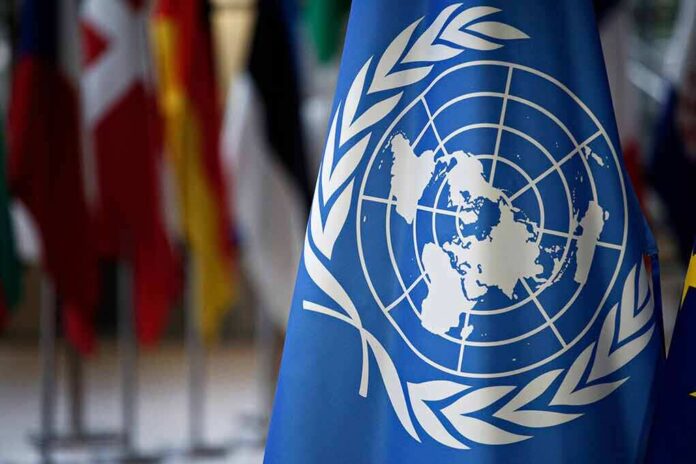
At a Glance
- The U.N. is implementing a new international agreement to address cybercrime
- Critics warn the treaty could lead to expanded invasive electronic surveillance
- The Biden administration supports the treaty, citing a balance between privacy concerns and global criminal pursuit
- Business groups and tech companies express concerns about the treaty’s potential for abuse
- The treaty becomes law upon approval by 40 nations
U.N. Cybercrime Treaty: A Double-Edged Sword
The United Nations is on the brink of implementing a new international agreement to combat cybercrime, a move that has sparked intense debate over its potential consequences. Nearly 200 nations have approved this global deal, aimed at addressing the criminal use of computer technology. The United Nations Convention against Cybercrime seeks to tackle a range of internet-related crimes, including illegal access, electronic eavesdropping, and online child sex abuse.
While the treaty’s intentions appear noble, it has raised significant concerns among human rights advocates and technology experts. Critics argue that the agreement could provide a legal framework for governments to violate human rights by probing electronic communications and bypassing privacy safeguards. This concern is particularly acute given that the convention originated from a Russian initiative, leading some to see oppressive language embedded within the treaty.
Biden Administration’s Stance
The Biden administration has thrown its support behind the treaty, asserting that it strikes a balance between privacy concerns and the need to pursue criminal activity on a global scale. A senior U.S. administration official familiar with the negotiation process stated, “We see this convention as a means to expand global law-enforcement cooperation.” The official further emphasized, “We sought to find — to achieve — a balance, and we felt that we got to a balance between authorities for law enforcement and human rights.”
However, this stance has not quelled the concerns of critics who fear the treaty’s potential for abuse. Business groups and technology giants, including Amazon and Microsoft, participated in the negotiations and expressed reservations about the treaty’s vague language and its potential misuse.
Human Rights and Privacy Concerns
The treaty’s implications for human rights and privacy have become a focal point of criticism. Watchdog groups like the Electronic Frontier Foundation (EFF) and Human Rights Watch (HRW) have voiced strong opposition to the agreement. Katitza Rodríguez, the policy director for global privacy at the Electronic Frontier Foundation, warns, “I think it’s a blank check for abuse because it has a very broad scope for domestic and cross-border spying and surveillance and a lack of robust checks and balances.”
One of the most contentious aspects of the treaty is its provision barring electronic eavesdropping or hacking without government permission. This clause has alarmed rights advocates who fear it could be exploited by authoritarian regimes to justify spying and surveillance on dissidents, journalists, and activists.
Global Implications and Next Steps
As the treaty moves towards potential ratification, its global implications loom large. The agreement will become law upon the approval of 40 nations, a threshold that could be reached relatively quickly given the broad support it has already garnered. However, the U.S. State Department has emphasized the need for human rights protections in the implementation of the treaty, signaling ongoing concerns even among supporters.
The coming months will be crucial as the U.N. General Assembly’s 193 member states prepare to vote on the treaty. The outcome of this vote and the subsequent ratification process will have far-reaching consequences for global cybersecurity, human rights, and the delicate balance between law enforcement needs and individual privacy. As the Biden administration navigates this complex landscape, it must weigh the potential benefits of enhanced international cooperation against the risks to freedom and privacy that this treaty may pose.
Sources:
USCIB Voices Concerns About Current Text of UN Cybercrime Convention
Rethinking the United Nations Cybercrime Treaty
The UN is moving to fight cybercrime but privacy groups say human rights will be violated
New U.N. Cybercrime Treaty Could Threaten Human Rights
United States International Cyberspace & Digital Policy Strategy
State Department: UN cybercrime treaty must include human rights protections












